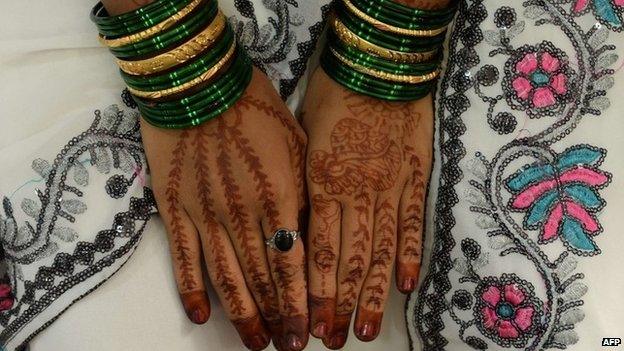India court says women 'misusing' dowry law
- Published

More than 8,000 women are killed every year in India in dowry-related offences
India's Supreme Court has said that women are increasingly misusing the tough anti-dowry law to harass their husbands and in-laws.
The judges said the law was enacted to help women, but it was being used as "a weapon by disgruntled wives".
The court has now ordered the police to follow a nine-point checklist before arresting anyone on a dowry complaint.
Correspondents say dowry offences are a serious issue in India where more than 8,000 women are killed every year.
Paying and accepting dowry is a centuries-old South Asian tradition where the bride's parents gift cash, clothes and jewellery to the groom's family.
The practice has been illegal in India since 1961, but it continues to thrive and campaigners say it leaves women vulnerable to domestic violence and even death.
'Used as weapon'
To prevent dowry deaths and harassment of brides in their matrimonial homes, India introduced a tough anti-dowry law - Section 498A of the Indian Penal Code - in 1983.
A complaint under the law allows for immediate arrest and jailing of the accused, often the husband and his family members, but campaigners say the provision is frequently misused with many women filing false cases.
"The fact that Section 498A is a cognisable and non-bailable offence has lent it a dubious place of pride amongst the provisions that are used as weapons rather than shield by disgruntled wives," the two-judge bench of Justices CK Prasad and PC Ghose said in its order on Wednesday.
"The simplest way to harass is to get the husband and his relatives arrested under this provision. In a quite number of cases, bed-ridden grandfathers and grandmothers of the husbands, their sisters living abroad for decades are arrested," it added.
According to the National Crime Records Bureau statistics, nearly 200,000 people, including 47,951 women, were arrested over dowry offences in 2012, but only 15% of the accused were convicted, the court said.
Expressing concern over the misuse of the law, the judges ordered the police "not to automatically arrest" an accused, but to go through a "nine-point checklist" to "satisfy themselves about the necessity for arrest".
And if the police make an arrest, a magistrate must approve further detention of the accused, the court ruled.